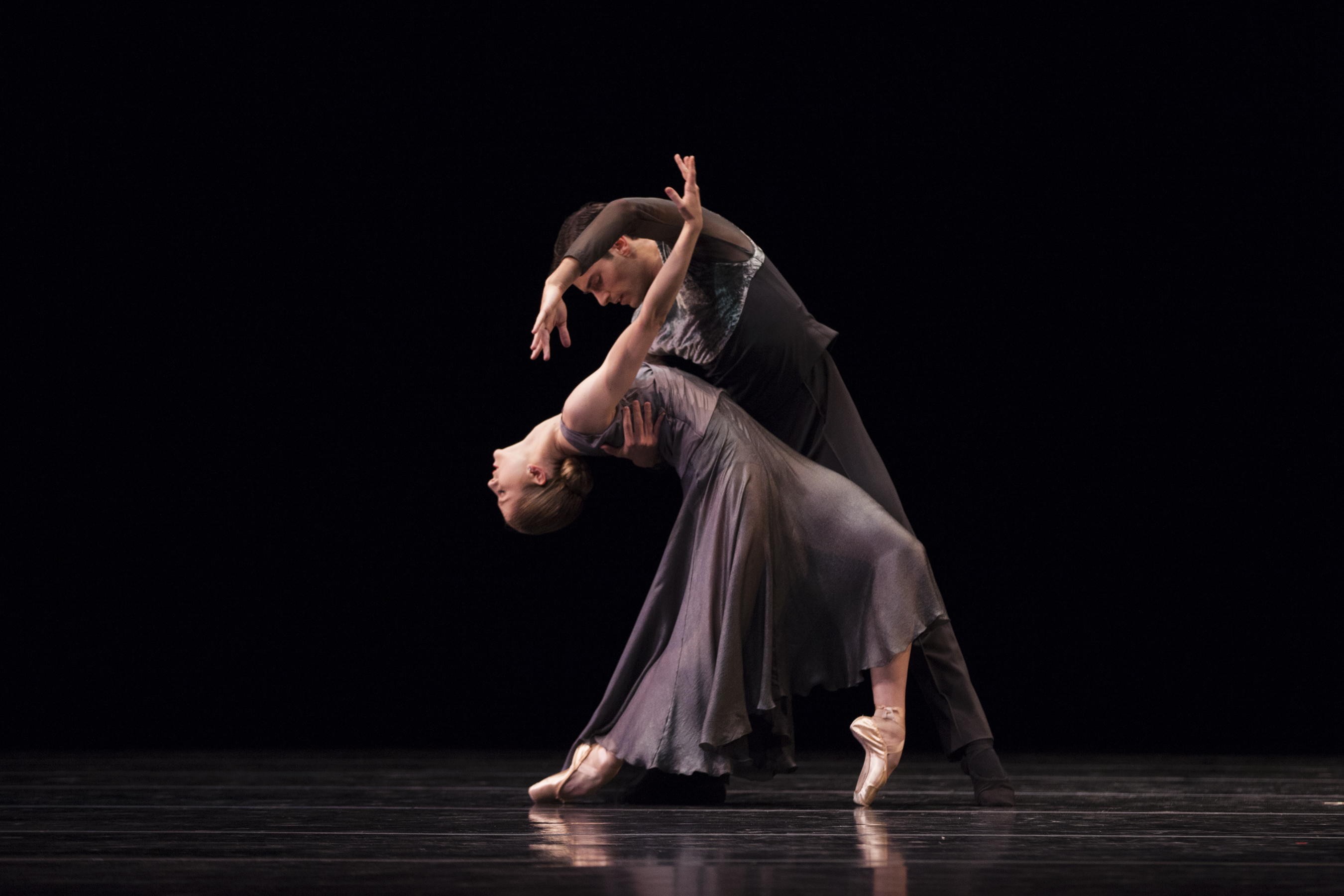PDirector’s Choice
McCaw Hall, 321 Mercer St. (Seattle Center), 441-2424, pnb.org. $28 and up. 7:30 p.m. Thurs.–Sat., 1 p.m. Sun. Ends Nov. 16.
If this Pacific Northwest Ballet program is designed to showcase the future of the art form, it looks like it’s going in at least a couple of directions. The evening opens and closes with pieces that explore the possibilities of classical ballet, bookending works that borrow some of their vocabulary from modern dance.
Nacho Duato’s Rassemblement and David Dawson’s A Million Kisses to My Skin are both company revivals. The Dawson is just as exhilarating as it was two years ago. It’s a neoclassical endurance test set to Bach, twisting and extending familiar material, setting virtuosic new levels for choreography and performance. Sarah Ricard Orza has a confident swagger while striding downstage; Carrie Imler and Jonathan Porretta bring trademark zest to their duet. The Duato has a more grounded physicality, and its score (by Toto Bissainthe) evokes the African roots of Haitian culture. Long-legged Lindsi Dec carves through the space like some kind of mother/priestess figure. Batkhurel Bold is more forceful—literally throwing himself to the floor for complex tumbling work.
Annabelle Lopez Ochoa is a young choreographer with a long resume in Europe and the U.S. PNB performed her Cylindrical Shadows in 2012, and is now adding her 2002 duet Before After to the repertory. This view of a dissolving relationship is full of missed connections and carefully crafted indifference. A lift that might once have been tender feels perfunctory when Raphael Bouchard sets Angelica Generosa down without looking where he’s putting her. The two drop hands and walk past each other without passion or remorse.
The title of Justin Peck’s new Debonair makes you think of Fred Astaire musicals, and the ballet does evoke some of that bygone glamour. Seemingly set at a party where young couples pursue romance, it opens and closes with a stream of bubbling duets and ensembles. The slower middle section, an extended duet, is the most poignant, as two dancers surge and retreat several times; we’re not sure until the end if they’ll form a lasting connection. Recently named choreographer in residence at New York City Ballet, Peck is in everyone’s sights right now. It’s easy to see why. His facility with ballet technique and ability to create kinetic excitement without a complex narrative make him a rare bird indeed. Sandra Kurtz
I Never Betrayed the Revolution
West of Lenin, 203 N. 36th St., 352-1777, westoflenin.com. $15–$20. 8 p.m. Thurs.–Sat., 2 p.m. Sun. Ends Nov. 23.
According to program notes, Christopher Danowski first showed his communism-satirizing script to A.J. Epstein 25 years ago, long before Epstein came to own the West of Lenin theater. Perhaps Russia’s recent totalitarian revival inspired Epstein to excavate it from the proverbial drawer for this belated debut. Excellent performers do their darnedest to bring the hazy parable to life, but the underlying material is thinner than the peasants’ taped-together scraps of shoe leather.
The “pan-Slavic” story revolves around two women, Daleka (Laurie Jerger) and Henryka (Susanna Burney), who, hungry and angry, journey to their unnamed nation’s capital to wrangle promised funds from a craven functionary named General Chuchelow (side-splitting physical comedian K. Brian Neel, in full glory). Their many nano-scene misadventures are introduced by unhelpful placards wielded by mirthless assistant Polina (Kate Kraay)—e.g., “A Room. Later.” All this wasted furniture rearrangement/setup time merely yields scenes that fizzle out arbitrarily (like so many headlines), instead of following any purposeful progression. Point conveyed, irritating elements persist.
Daleka gets embroiled in the movement against the corrupt Chuchelow and winds up trussed in a general’s uniform (adorned with butterfly wings) as the next leader. Other well-portrayed characters include an insane couple who fetishize a cow doll (Ty Bonneville and Andy Buffelen); a deposed former leader (Chris Dietz) who now dresses in a pink tutu; and a young military bugler (Matt Aguayo) so hungry or drunk or consumptive that he staggers vertiginously, like gravity’s love slave.
Richard Lorig’s set is simple and effective; though again, too much time is spent rearranging it in the dark before each brief episode. If you really love absurdist theater, given the cast-crafted humor and even pathos here, it’s possible to forgive the choppiness, the repetitions, the meandering and predictability. Twenty-five years after the Berlin Wall came down, Danowski’s script (directed by Epstein) offers sophomoric truths that are no less true for being tedious, even today. Margaret Friedman
E
stage@seattleweekly.com




